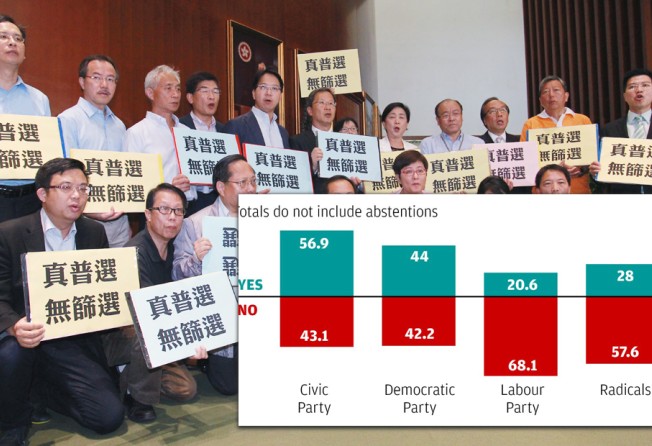
Parties' Legco voting records show a blurring of political lines, Post finds
Study finds Liberal Party supporting pan-dems, and Labour Party 'more radical' than radicals

Business-unfriendly policies such as doubling the property stamp duty have pushed the Liberal Party - a traditional ally of the government - closer to its most vocal critics, the pan-democrats.
This is indicated by a South China Morning Post study of Legislative Council voting records over the past year.
The study shows the Liberal Party voted in favour of motions tabled by pan-democrats 40 per cent of the time. By comparison, the leading pro-establishment party, the Democratic Alliance for the Betterment and Progress of Hong Kong (DAB), voted in favour of pan-democrat motions just 17 per cent of the time.
The DAB, which aims to attract middle-class votes, and the other main pro-establishment group, the labour-focused Federation of Trade Unions, appear at loggerheads, each opposing almost half of the other's motions.
The unclear battle lines were highlighted by the vote on the doubling of the property stamp duty to curb speculation, a brainchild of Chief Executive Leung Chun-ying.
This was approved on July 15 with opposition from only six lawmakers - all pro-government.
"The government has in fact done badly on many fronts; the lack of communication with lawmakers is one of them," Liberal Party lawmaker Felix Chung Kwok-pan said.
Chung, one of the opponents of the law, said it was detrimental to bona fide businessmen.
The Liberals were not the only critics of the bill. The Business and Professionals Alliance had also been opposed but only one of its members - Abraham Razack, of the real estate constituency - voted against it.
Asked if the two groups could cooperate, Chung said: "The BPA is quite weird. Only Razack staged a one-man dance at the end of the debate."
Of the Liberals' three motion amendments in the past year, the alliance endorsed only one.
Alliance support for the government might not be surprising, given the appointment of one of its lawmakers, Jeffrey Lam Kin-fung, to the Executive Council by Leung late in 2012.
Perhaps more surprising is that in combating motions raised by pro-government groups, the "radical" pan-democrats - at least statistically - behaved less radically than the Labour Party.
The four Labour lawmakers cast 68 per cent of their votes against pro-government groups, 10 per cent more than the four supposedly radical lawmakers.
And while government allies apart from the Liberal Party showed little favour towards pan-democrats, the Civic Party and Democratic Party were open to proposals by such groups.
The Civic Party, in particular, voted in favour of pro-establishment groups' motions 57 per cent of the time, including on such issues as the development of border town Lok Ma Chau and help for cross-border students. Their votes were at odds with those of radical pan-democrats.
Dr Brian Fong Chi-hang of SynergyNet, a policy think-tank, said the Liberal Party had been upset by a string of populist policies both before and after Leung came to power.
Its fluctuating stance, Fong added, reflected its desire to fight for more political bargaining power with the government by acting as the "critical minority".
The Post examined 151 lawmakers' motions and amendments, excluding filibusters, and 23 government bills available in the Legco system.
Additional reporting by Michelle Toh and Sarah Karacs